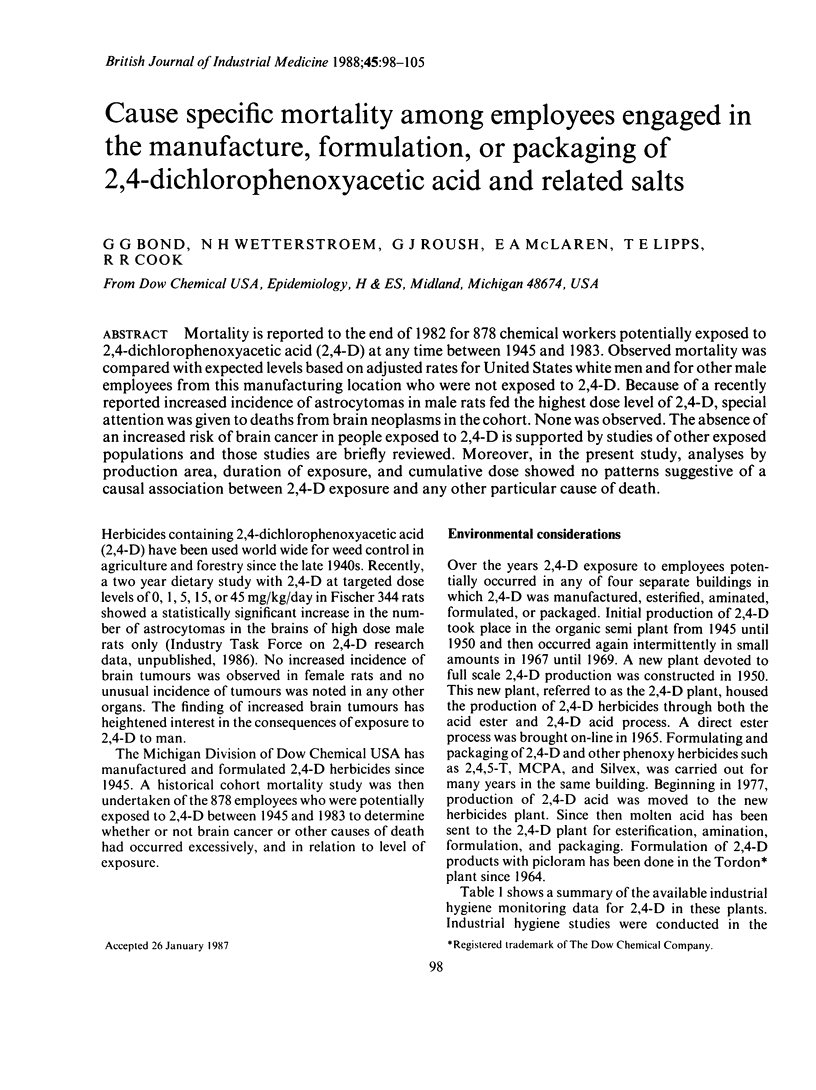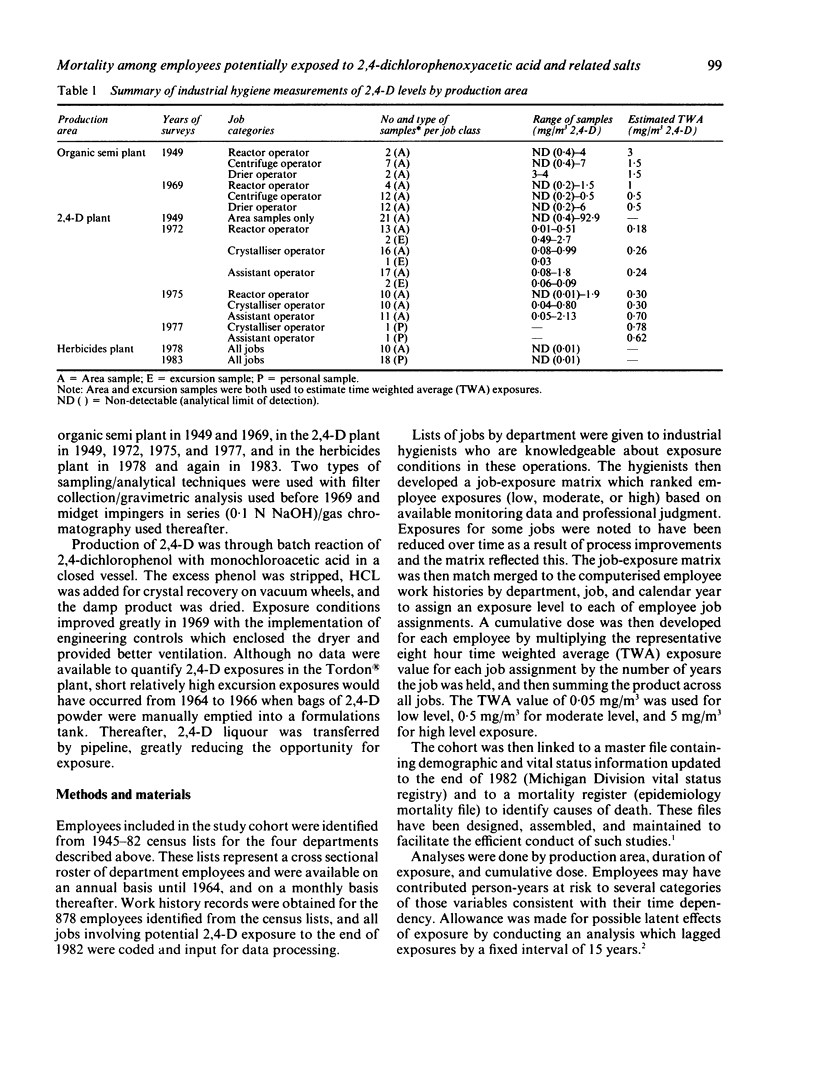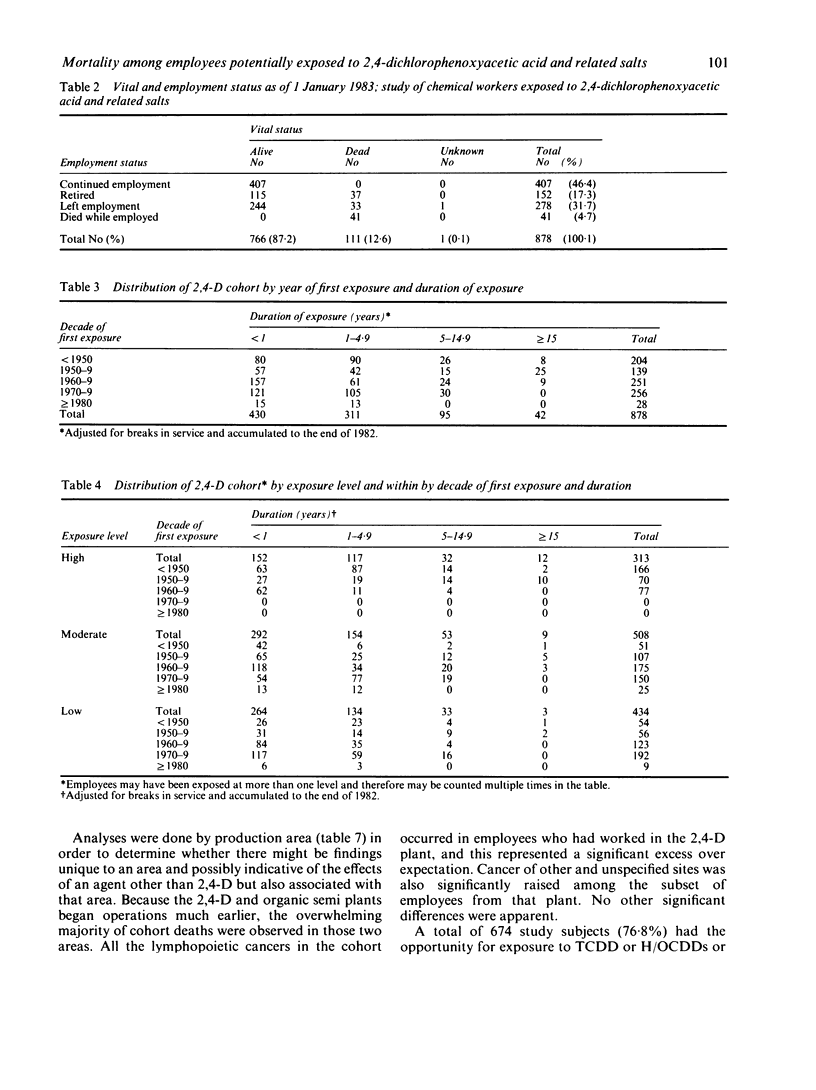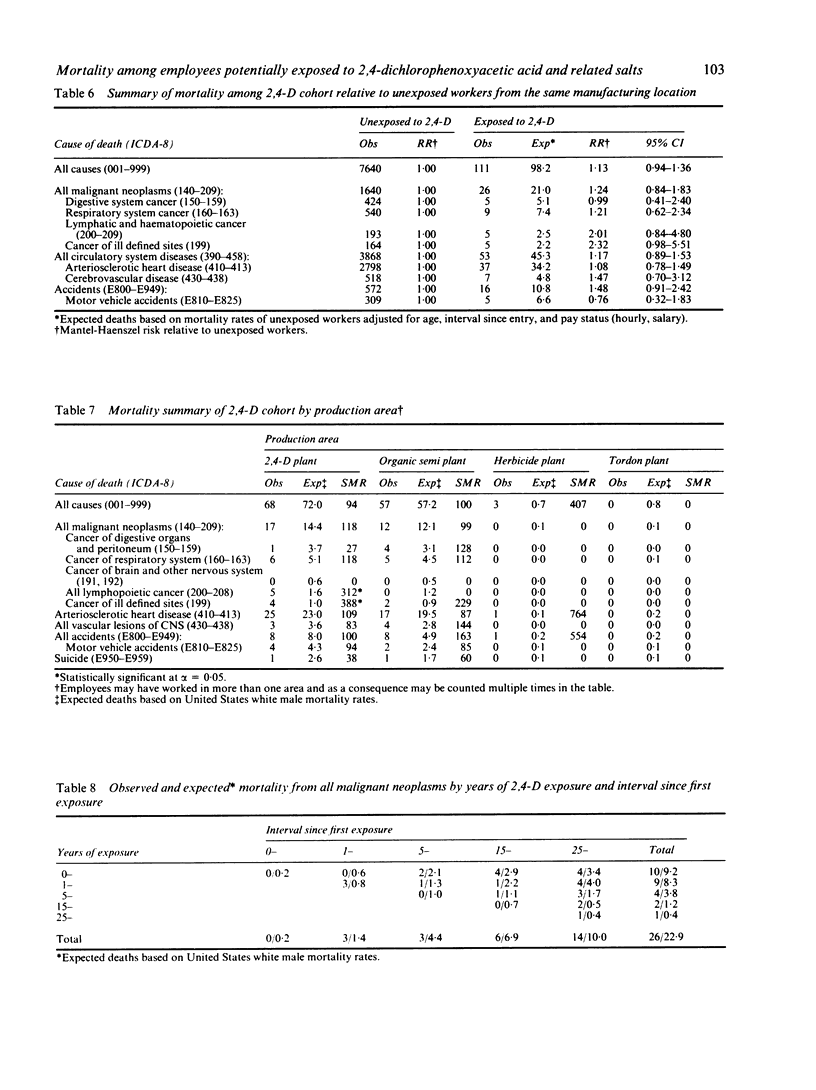Abstract
Mortality is reported to the end of 1982 for 878 chemical workers potentially exposed to 2,4-dichlorophenoxyacetic acid (2,4-D) at any time between 1945 and 1983. Observed mortality was compared with expected levels based on adjusted rates for United States white men and for other male employees from this manufacturing location who were not exposed to 2,4-D. Because of a recently reported increased incidence of astrocytomas in male rats fed the highest dose level of 2,4-D, special attention was given to deaths from brain neoplasms in the cohort. None was observed. The absence of an increased risk of brain cancer in people exposed to 2,4-D is supported by studies of other exposed populations and those studies are briefly reviewed. Moreover, in the present study, analyses by production area, duration of exposure, and cumulative dose showed no patterns suggestive of a causal association between 2,4-D exposure and any other particular cause of death.
Full text
PDF







Selected References
These references are in PubMed. This may not be the complete list of references from this article.
- Axelson O., Sundell L., Andersson K., Edling C., Hogstedt C., Kling H. Herbicide exposure and tumor mortality. An updated epidemiologic investigation on Swedish railroad workers. Scand J Work Environ Health. 1980 Mar;6(1):73–79. doi: 10.5271/sjweh.2631. [DOI] [PubMed] [Google Scholar]
- Barthel E. Increased risk of lung cancer in pesticide-exposed male agricultural workers. J Toxicol Environ Health. 1981 Nov-Dec;8(5-6):1027–1040. doi: 10.1080/15287398109530135. [DOI] [PubMed] [Google Scholar]
- Bond G. G., McLaren E. A., Baldwin C. L., Cook R. R. An update of mortality among chemical workers exposed to benzene. Br J Ind Med. 1986 Oct;43(10):685–691. doi: 10.1136/oem.43.10.685. [DOI] [PMC free article] [PubMed] [Google Scholar]
- Bond G. G., McLaren E. A., Cartmill J. B., Wymer K. T., Sobel W., Lipps T. E., Cook R. R. Cause-specific mortality among male chemical workers. Am J Ind Med. 1987;12(4):353–383. doi: 10.1002/ajim.4700120403. [DOI] [PubMed] [Google Scholar]
- Buesching D. P., Wollstadt L. Cancer mortality among farmers. J Natl Cancer Inst. 1984 Mar;72(3):503–504. [PubMed] [Google Scholar]
- Cantor K. P. Farming and mortality from non-Hodgkin's lymphoma: a case-control study. Int J Cancer. 1982 Mar 15;29(3):239–247. doi: 10.1002/ijc.2910290303. [DOI] [PubMed] [Google Scholar]
- Doll R. Occupational cancer: a hazard for epidemiologists. Int J Epidemiol. 1985 Mar;14(1):22–31. doi: 10.1093/ije/14.1.22. [DOI] [PubMed] [Google Scholar]
- Enterline P. E., Marsh G. M. Cancer among workers exposed to arsenic and other substances in a copper smelter. Am J Epidemiol. 1982 Dec;116(6):895–911. doi: 10.1093/oxfordjournals.aje.a113492. [DOI] [PubMed] [Google Scholar]
- Feo Figarella E., Morillo F., Blanca I., Bianco N. E. Failure of cell-mediated effector mechanisms in lung cancer. J Natl Cancer Inst. 1984 Jul;73(1):1–6. [PubMed] [Google Scholar]
- Hakulinen T. A Mantel-Haenszel statistic for testing the association between a polychotomous exposure and a rare outcome. Am J Epidemiol. 1981 Feb;113(2):192–197. doi: 10.1093/oxfordjournals.aje.a113083. [DOI] [PubMed] [Google Scholar]
- Hoar S. K., Blair A., Holmes F. F., Boysen C. D., Robel R. J., Hoover R., Fraumeni J. F., Jr Agricultural herbicide use and risk of lymphoma and soft-tissue sarcoma. JAMA. 1986 Sep 5;256(9):1141–1147. [PubMed] [Google Scholar]
- Miettinen O. Estimability and estimation in case-referent studies. Am J Epidemiol. 1976 Feb;103(2):226–235. doi: 10.1093/oxfordjournals.aje.a112220. [DOI] [PubMed] [Google Scholar]
- Monson R. R. Analysis of relative survival and proportional mortality. Comput Biomed Res. 1974 Aug;7(4):325–332. doi: 10.1016/0010-4809(74)90010-x. [DOI] [PubMed] [Google Scholar]
- Pearce N. E., Smith A. H., Howard J. K., Sheppard R. A., Giles H. J., Teague C. A. Non-Hodgkin's lymphoma and exposure to phenoxyherbicides, chlorophenols, fencing work, and meat works employment: a case-control study. Br J Ind Med. 1986 Feb;43(2):75–83. doi: 10.1136/oem.43.2.75. [DOI] [PMC free article] [PubMed] [Google Scholar]
- Riihimäki V., Asp S., Hernberg S. Mortality of 2,4-dichlorophenoxyacetic acid and 2,4,5-trichlorophenoxyacetic acid herbicide applicators in Finland: first report of an ongoing prospective cohort study. Scand J Work Environ Health. 1982 Mar;8(1):37–42. doi: 10.5271/sjweh.2498. [DOI] [PubMed] [Google Scholar]
- Wiklund K., Holm L. E. Soft tissue sarcoma risk in Swedish agricultural and forestry workers. J Natl Cancer Inst. 1986 Feb;76(2):229–234. [PubMed] [Google Scholar]
- Woods J. S., Polissar L., Severson R. K., Heuser L. S., Kulander B. G. Soft tissue sarcoma and non-Hodgkin's lymphoma in relation to phenoxyherbicide and chlorinated phenol exposure in western Washington. J Natl Cancer Inst. 1987 May;78(5):899–910. [PubMed] [Google Scholar]


